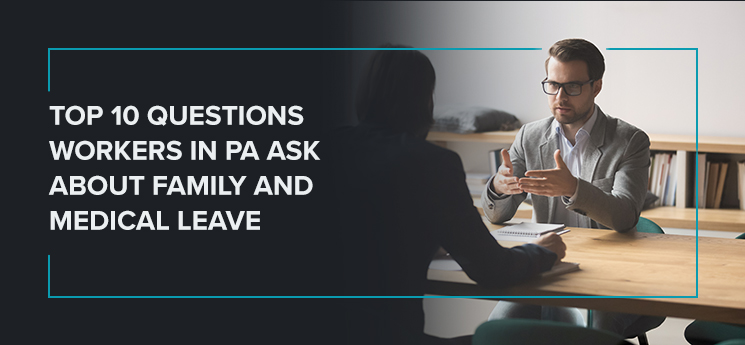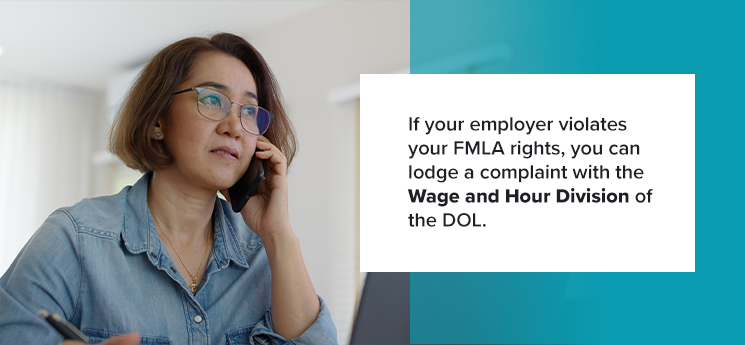Do you know the average person spends one-third of their life at work? That’s 90,000 hours total. Work forms a big part of our lives, but maintaining a good work-life balance is equally important to personal and social growth. Sometimes, we need time off work to attend to important personal matters. Does the law protect you in such situations? Can you take leave for certain family and medical reasons?
In this article, we’ll discuss the family and medical leave laws in PA in detail to guide you in exercising your rights under the Family and Medical Leave Act of 1993 (FMLA).
What Are FMLA Laws in PA?
The FMLA law regulates the employer-employee relationship to the extent that an employee may take time off to attend to medical or family issues. The law applies to all 50 States, including Pennsylvania.
For example, the law allows you to skip work when you encounter an emergency that is covered by the FMLA. This means your employer is not permitted to terminate your employment, contract, or sanction you if you have justifiable reasons for taking a leave of absence. However, your employer may terminate your employment contract for other distinct reasons justified under the law. Some of these justifiable reasons include:
- Poor performance at work
- Deliberate refusal to work
- Poor attendance record
- Disciplinary actions such as sexual harassment and discrimination
This list is not exhaustive. Nonetheless, your employer should not terminate your employment or sanction you solely because you exercised your rights under the FMLA. It is important to emphasize that any violation of the FMLA constitutes workplace discrimination.
Apart from the FMLA, the Americans with Disability Act of 1990 (ADA) provides added protection for persons with a disability. Other relevant laws, such as Title VII of the Civil Right Act of 1964 and the Age Discrimination in Employment Act of 1967 (ADEA), safeguard employees against discrimination. Additionally, the law prohibits employers from retaliating against an employee for making good faith complaints of an employer’s violation of their legally protected rights under these laws.
To Whom Does FMLA Apply?
The FMLA law applies to specific institutional setups in Pennsylvania. The law refers to the employers captured under the FMLA as ‘covered employers.’ The following guidelines will assist you in knowing whether you’re protected:
- At least 50 of the employees in the organization must be employed within 75 miles of your place of work.
- You should have worked for at least one year in that organization.
- You must work a minimum of 1,250 hours within the last 12 months in that employment.
What Qualifies as FMLA Leave in PA?
Generally, the reason for your leave of absence should relate to family and medical issues. The Department of Labor (DOL), however, provides some guidance. These reasons include caring for:
- A newborn child within a year of birth.
- A newly adopted child or a child placed in the foster care of the employee within one year of the placement.
- A child under 18 or a child of any age with a disability that renders them incapable of self-care.
- A spouse or parent with a severe medical condition.
- A spouse, child or parent in active duty as a military member, where the exigency demands.
- Your own serious medical condition.
How Long Is FMLA Leave in PA?
The FMLA prescribes 12 work weeks of leave within a period of 12 months for employees who fall within a qualifying category. However, you may apply for intermittent leave when needed, which means you’re not obliged to take all the leave at once.
You’re entitled to 26 workweeks of leave during a single 12-month period if you’re caring for a covered servicemember spouse, child, parent or next of kin who is seriously injured or ill.
Does FMLA Entitle You to Pay?
Your employer is not mandated to pay you while on leave under the FMLA. The FMLA only requires unpaid leave. Your employment arrangement may require you to use all accrued paid leave during your FMLA leave. In that situation, the paid leave may replace the unpaid leave, entitling you to receive payment.
Should You Inform Your Employer Before Taking FMLA Leave?
Give your employer a 30-day notice of your intention to take the FMLA leave. This is usually the case where the need is foreseeable. However, this requirement is not strict — simply inform your employer as soon as possible and fill out the necessary paperwork.
Can Your Employer Demand Proof for Taking FMLA Leave?
Generally, your employer is entitled to evidence confirming that you are taking a leave of absence. However, your employer is not entitled to demand certain delicate or personal information. For instance, the law does not permit your employer to insist on medical records. He may, however, demand clarification from the medical officer.
Persons in management positions or human resources may act on behalf of your employer. The medical clearance should be credible and must satisfy the employer. Your employer must notify you in writing to provide sufficient information regarding the leave if they are unsatisfied. The request, however, must be reasonable.
What Are Some Common FMLA Violations?
FMLA breaches are common at workplaces. These include:
- Terminating the employment contract: Some employers dismiss employees when they exercise their rights under the FMLA. The intention of the employer does not matter in such situations. As an employee, the FMLA protects you against unlawful dismissal. The court may compensate you.
- Denying employee leave: There are instances where employers refuse employees’ requests to take leave under FMLA, even on justifiable grounds. The law entitles you to leave for a serious illness or injury, as defined in the FMLA, when you are incapable of performing your duties as an employee.
- Failing to handle benefits properly: As an employee, you’re still entitled to benefits when under FMLA leave. Your employee must continue to honor your health insurance and other benefits which accrued before, during and after your leave.
- Counting FLMA leave as absent days: Some employers mistake FMLA leave for ordinary absent days. This affects your performance reviews and salary. There are even days when you work from home. Your employer should not count those as part of your FMLA leave.
- Demoting the employee: When you return from the FMLA you’re entitled to all benefits. The employer should not demote you to a lesser position due to your FMLA leave. Your employer should reinstate you to the original position or place you in a similar role. This is called the “right to restoration.” If you are due for promotion, your employer must honor that accordingly.
What Can You Do When Your Employer Violates Your FMLA Rights?
If your employer violates your FMLA rights, you can lodge a complaint with the Wage and Hour Division of the DOL. You can also institute a civil action against your employer for compensation.
The court may order the employer to make payment of financial losses or reinstate your job and benefits.
Which Employment Law Firm Should You Consult?
An employment law attorney can guide you in filing a complaint with the DOL or commencing a civil action. Whatever the case, Weisberg Cummings is available to help you determine if you have a claim.
Weisberg Cumming is an employment law firm in Pennsylvania with over 40 years of combined experience assisting employers to safeguard their rights. We handle various personal injury and employment claims, including matters involving discrimination, sexual harassment, employment retaliation and ADA and FMLA violations.
Request a free consultation today from Weisberg Cumming for all FMLA concerns.



